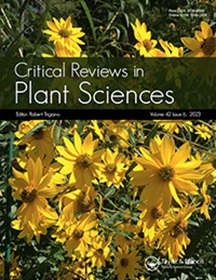From Stress to Success: Harnessing Technological Advancements to Overcome Climate Change Impacts in Citriculture
IF 4.9
2区 生物学
Q1 PLANT SCIENCES
引用次数: 0
Abstract
AbstractClimate change, primarily caused by human activities, leads to persistent alterations in Earth’s long-term weather patterns and temperatures, resulting in substantial regional climate disparities that significantly impact agricultural output. In the realm of sustainable citriculture, climate change poses a notable challenge by inducing abiotic stresses within citrus-producing regions. Projections suggest rising air temperatures by 2.2-5.1 °C, heightened instances of temperatures exceeding 30 °C during dry spells, freezing events, a reduction in rainfall by at least 4%, and amplified monsoonal precipitations. Such changes will inevitably affect citrus tree physiology and yield quality. The intricate connection between external climatic conditions and crucial physiological processes underscores the profound influence of climate change. Temperature fluctuations can disrupt leaf photosynthesis, stomatal conductance, flower and fruit development, fruit sugar production, coloration, abscission, carbohydrate accumulation, and ultimate fruit yield. This comprehensive review delves into the specific repercussions of climate change on citrus cultivation, focusing on variables like temperature variations, water availability, light intensity, atmospheric CO2 concentration, and salinity stress. Our exploration elucidates the adverse impact of these stressors on citrus crops, while highlighting innovative tactics and emerging technologies, including advanced monitoring systems, precision irrigation, automated climate regulation, molecular priming through biostimulants, shade netting, and particle film technologies. By mitigating the adverse effects of environmental stressors, these strategies empower citrus growers to navigate challenges like excessive solar radiation, temperature fluctuations, soil moisture management, erosion prevention, and enhanced soil quality. These combined efforts forge a path toward a more resilient citriculture capable of effectively countering the abiotic stresses stemming from climate change.Keywords: Citricultureclimate changeabiotic stresstechnological advancementscultivation strategies从压力到成功:利用技术进步克服气候变化对柑橘的影响
摘要气候变化主要由人类活动引起,导致地球长期天气模式和温度的持续变化,从而导致显著的区域气候差异,从而显著影响农业产出。在柑橘可持续发展领域,气候变化对柑橘产区的非生物胁迫构成了显著的挑战。预测表明,气温将上升2.2-5.1°C,干旱期气温超过30°C的情况增加,出现冰冻事件,降雨量至少减少4%,季风降水将增加。这些变化不可避免地会影响柑橘树的生理和产量品质。外部气候条件与关键生理过程之间的复杂联系凸显了气候变化的深远影响。温度波动会破坏叶片光合作用、气孔导度、花和果实发育、果糖生产、着色、脱落、碳水化合物积累和最终果实产量。这篇综合综述深入研究了气候变化对柑橘种植的具体影响,重点关注温度变化、水分有效性、光照强度、大气二氧化碳浓度和盐度胁迫等变量。我们的探索阐明了这些压力源对柑橘作物的不利影响,同时强调了创新策略和新兴技术,包括先进的监测系统、精确灌溉、自动化气候调节、通过生物刺激素进行分子启动、遮阳网和颗粒膜技术。通过减轻环境压力因素的不利影响,这些策略使柑橘种植者能够应对诸如过度太阳辐射、温度波动、土壤水分管理、防止侵蚀和提高土壤质量等挑战。这些共同的努力为更有弹性的柑橘开辟了一条道路,能够有效地应对气候变化带来的非生物压力。关键词:柑橘气候变化生物胁迫技术进步栽培策略
本文章由计算机程序翻译,如有差异,请以英文原文为准。
求助全文
约1分钟内获得全文
求助全文
来源期刊
CiteScore
12.90
自引率
1.40%
发文量
15
审稿时长
>12 weeks
期刊介绍:
Critical Reviews in Plant Sciences focuses on presenting in-depth and up-to-date reviews of timely and/or cutting-edge subjects in the broad discipline of plant science, ranging from molecular biology/biochemistry through the areas of cell biology, plant pathology and physiology, genetics, classical botany, and ecology, to practical agricultural applications. Articles in the journal provide an up-to-date literature base for researchers and students, pointing the way towards future research needs. The journal is also a significant source of credible, objective information to aid decision makers at all levels.

 求助内容:
求助内容: 应助结果提醒方式:
应助结果提醒方式:


